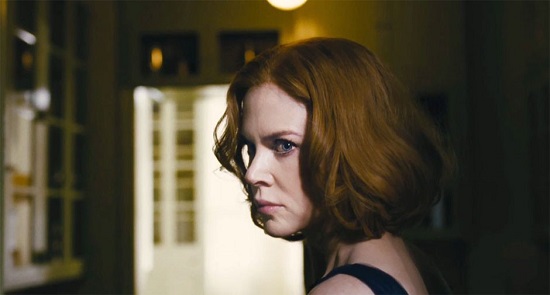English language forays by distinctive directors from foreign lands are mixed affairs. Despite the success of intense, if slightly ridiculous, thrillers like Face/Off, John Woo never regained the heights of Hard Boiled, while South Korean director Kim Ji-woon, creator of the brilliant A Tale Of Two Sisters and The Good, The Bad, The Weird directed Arnie’s lamentable comeback, The Last Stand.
Others have thrived – look at the unstoppable Werner Herzog. But the worry lingers. What made a director special may be lost or diluted in making the transition to English, often through studio pressures.
It’s with some relief that Park Chan-wook, director of the mentalist classic Oldboy and Thirst, has made the transition with some style, creating a compelling and consistently enjoyable first step into English language cinema.
Park is backed by a fine team. The Scott brothers produce (it was the final film Tony Scott was involved with before his suicide), and have nurtured the production, featuring rising star Mia Wasikowska, best known for her lead in Tim Burton’s version of Alice In Wonderland, and a striking return to form from Nicole Kidman, all designed and dressed to perfection by Black Swan designer Thérèse DePrez.
Prison Break creator Wentworth Miller spent eight years developing the script, his first, instructing his agent to keep his identity secret until the project took off. On one level, the film is a homage to Alfred Hitchcock, and represents something tonally close to what The Master himself might have composed, especially when compared to the competing biopics currently circulating.
Wasikowska plays India Stoker, an 18-year-old coming to terms with the sudden death of her father in a car accident. She is intelligent but buttoned-up, her rather prim dresses reflecting her studious character. At the wake her long-lost Uncle Charlie, a smug, distant and somewhat sinister character played by Matthew Goode, suddenly arrives and decides to stay.
India is wary of Uncle Charlie, but he quickly bewitches her mother, the confused and shattered Evelyn, played pitch-perfect by Nicole Kidman.
Wasikowska carries the film and is a compelling screen presence, bringing a beguiling mix of inscrutability, menace and innocence to India’s emergence from her father’s death and from childhood.
Hitchcock’s Shadow Of A Doubt is the obvious starting point, using the same basic premise – a young girl comes to realise that her beloved Uncle Charlie may be a serial killer. Stoker moves the concept into new territory, developing the quiet hysteria of Hitchcock’s original into something more modern, controlled and ambiguous.
Shadow Of A Doubt is the first of many Hitchcock references – a grotty motel and shower scene reference Psycho for instance – but all take novel and sometimes perverse tangents to their inspiration.
Even the score namechecks Hitchcock’s preferred composer. Clint Mansell, whose scores are often influenced by Philip Glass (think Requiem For A Dream or Moon) goes for a much bigger sound than usual and one worthy of Bernard Herrmann. Glass himself contributes a single piece specifically for a remarkable scene between India and Uncle Charlie at the piano, which echoes Herrmann’s Vertigo theme before moving on at a dazzling, dizzying pace.
Park has made the most of the talents available to him, bringing longtime collaborator and cinematographer Jeong Jeong-hoon from Seoul as part of the creative core of the film, developing a dreamlike twilight for the characters to inhabit.
While the film is a little ponderous at the start, partly due to the distinct lack of dialogue, the story is slick with plot points and set pieces. And being the director of Oldboy, there is a trademark dose of gore and perversity on top to mark this apart from the products of the Hollywood sausage factory.
Stylstically, everything about the film is near perfect, but this sheer perfection makes it a slightly hard film to love. Even the beautiful asides, such as India’s birthday presents – blue and white bowling-style shoes hidden for her every year – make for wonderful visual images, but are executed with a certain iciness.
This iciness actually adds to the tension so that when the shocks hit – which they do – the power is accentuated. This is all part of the design, as are the performances which, just like in classic David Lynch, seem ever so slightly off – both Wasikowska and Goode seeming to break the fourth wall which only adds to the eeriness.
The result is undoubtedly compelling, and should give Park the freedom to develop whatever he wants for his next project. Something worth waiting for, whatever the language he chooses.


